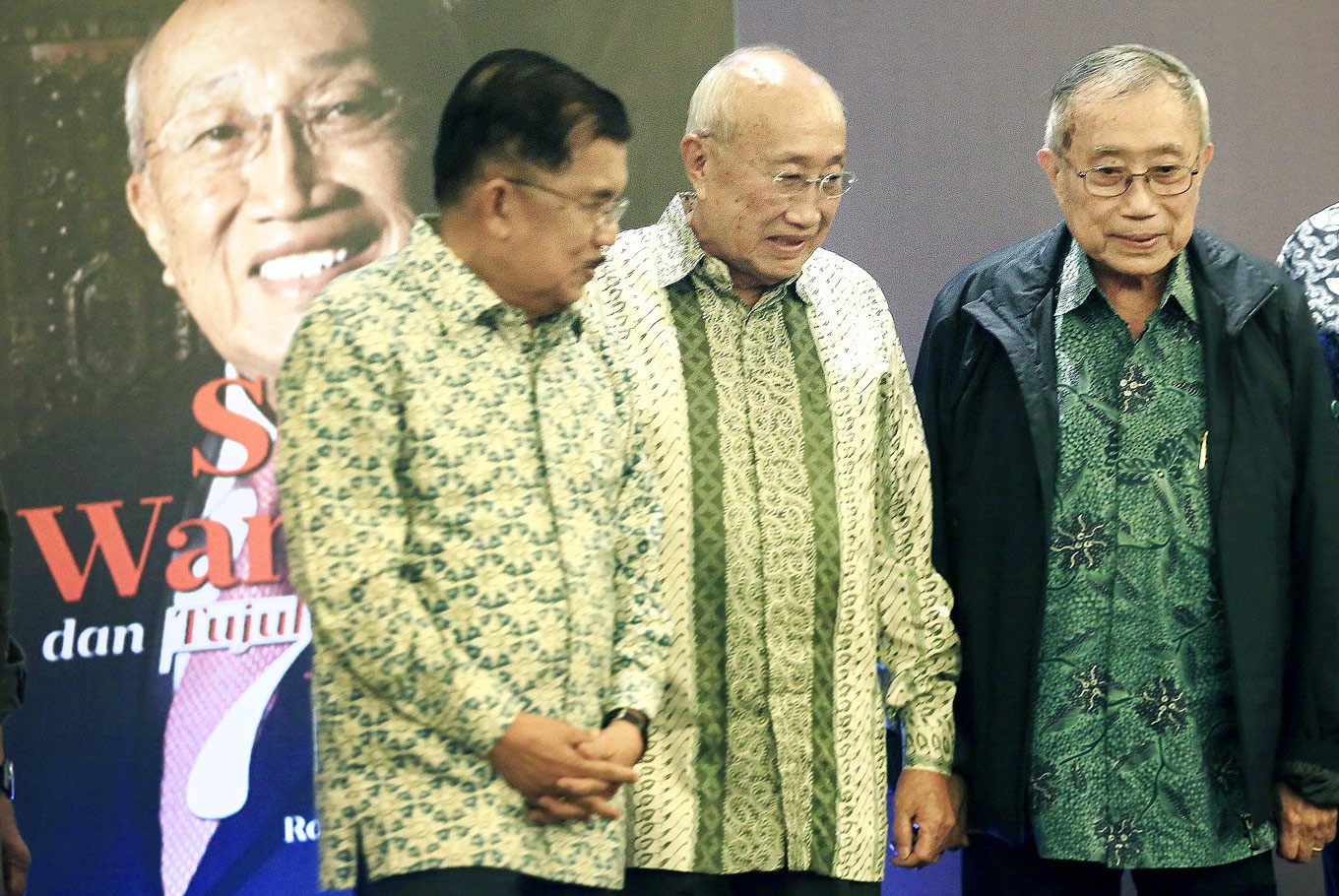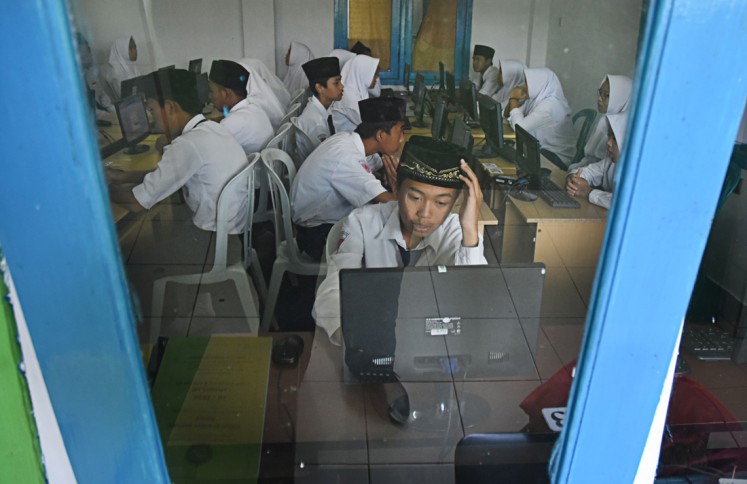Tycoon Sofjan Wanandi wants to improve Indonesia's education system
According to data from the Central Statistics Agency (BPS), as of 2016, 59.6 percent of Indonesia’s workforce consists of elementary and junior high school graduates.
Change Size
 Vice President Jusuf Kalla (left) talks with former chairman of the Indonesian Employers Association (Apindo) Sofjan Wanandi (center) and vice chair of the board of trustees of the Centre for Strategic and International Studies (CSIS) Jusuf Wanandi at the launch of Sofjan Wanandi dan Tujuh Presiden — My Love for My Country in Jakarta on Wednesday. (JP/Dhoni Setiawan)
Vice President Jusuf Kalla (left) talks with former chairman of the Indonesian Employers Association (Apindo) Sofjan Wanandi (center) and vice chair of the board of trustees of the Centre for Strategic and International Studies (CSIS) Jusuf Wanandi at the launch of Sofjan Wanandi dan Tujuh Presiden — My Love for My Country in Jakarta on Wednesday. (JP/Dhoni Setiawan)
B
usiness tycoon and politician Sofjan Wanandi turned 77 years old this year, but his spirit to improve the nation stays forever young. Improving the education in the country is his next target.
During his younger days in 1971, he helped build the Centre for Strategic and International Studies (CSIS), a Jakarta-based research institute specializing in politics and the economy. He then helped establish Prasetya Mulya Business School in 1982.
The special staff for Vice President Jusuf Kalla said he wanted to improve education in a broader sense.
“The first national concept is with Pak [Jusuf]. We want to invite foreign universities to come here,” he told The Jakarta Post during the launch of his latest book Sofjan Wanandi dan Tujuh Presiden (Sofjan Wanandi and Seven Presidents) at JS Luwansa Hotel in Jakarta on Wednesday.
Sofjan targets for the plan to be executed this year. Previously, the Research, Technology and Higher Education Ministry revealed that two foreign universities, Melbourne University and the Royal Melbourne Institute of Technology (RMIT), had fulfilled the requirements to establish a branch in Indonesia.
The plan, however, was not without controversy, especially in terms of workforce. At least 200 foreign lecturers were needed to work in the local branch of the foreign universities.
Sofjan acknowledged the problem. However, he said this reality was a bitter pill Indonesia needed to swallow to push its education sector, which had seen stagnant growth and was irrelevant in the corporate sector.

According to data from the Central Statistics Agency (BPS), as of 2016, 59.6 percent of Indonesia’s workforce consists of elementary and junior high school graduates.
“Industry 4.0 is coming shortly, but our education system is not ready. With foreign campus’ [presence in Indonesia], local [universities] will be motivated to keep up with the quality,” he told the Post.
After improving higher education, Sofjan wanted to improve basic education, from elementary, junior high to high school. He thought that Indonesia’s basic education system had too much emphasis on the number of subjects being studied while neglecting the quality of the outcome.
“We have too many subjects in school, but it results in shallow knowledge. In the end, parents are sending their children abroad. But not all parents have the money to do so,” he said.
With an improved education system, he hoped that in the future it could improve the living quality, as well as economic and political conditions in Indonesia. Currently, he said, many politicians in Indonesia did not think about improving the nation but only thought about their own interests.
“In Indonesia, political parties are being used for a group’s interest. We are fighting against our own brothers and we’ve forgotten to build the nation,” he said.
“It has to start from education, and we need leaders who can give an example,” he said.
Other than education, Sofjan also wanted to create policies that could support small and medium enterprises (SMEs). He acknowledged that in his past work, he did not give much attention to smaller businesses.
“In the past, I was only focused on the big enterprises. Now I want to concentrate on SMEs. We still have a big gap between SMEs and the bigger businesses,” he told the Post.
Triputra Group founder and former Astra International president director Theodore “Teddy” Permadi Rachmat, who attended the book launch, hoped that Sofjan could continue work despite his age, comparing
Sofjan to Mahathir Mohamad, who was recently reelected as Malaysia’s prime minister at the age of 92.
“My hope is that if Mahathir is still working at the age of 92, Pak Sofjan must not lose to him,” he said during the book launch.
Other executives who attended the book launch, such as former Toyota Astra Motor (TAM) president director Johnny Darmawan Danusasmita and Prasetiya Mulya University rector Djisman Simandjuntak, wished the same thing for Sofjan.
Indonesian Employers Association (Apindo) deputy chairman Shinta Widjaja Kamdani said Sofjan was a different kind of businessman as he strived to give the best for the nation.
“We as business people usually only think about our own business and profit, but Pak Sofjan always said to be at the nation’s service,” she said.









